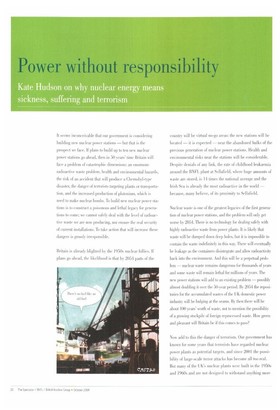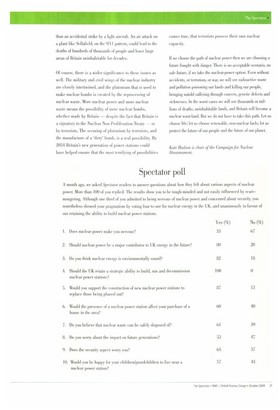ower without responsibility
Kate Hu son on Nir y nue ear energy e-ans sickness, suffering and terrorism It seems inconceivable that our government is considering building new nuclear power stations — but that is the prospect we face. If plans to build up to ten new nuclear power stations go ahead, then in 50 years' time Britain will face a problem of catastrophic dimensions: an enormous radioactive waste problem. health and environmental hazards, the risk of an accident that will produce a Chernobyl-type disaster, the danger of terrorists targeting plants or transportation, and the increased production of plutonium, which is used to make nuclear bombs. To build new nuclear power stations is to construct a poisonous and lethal legacy for generations to come; we cannot safely deal with the level of radioactive waste we are nowproducing, nor ensure the real security of current installations. To take action that will increase these dangers is grossly irresponsible.
Britain is already blighted by the 1950s nuclear follies. If plans go ahead, the likelihood is that by 2054 parts of the country will be virtual no-go areas: the new stations will he located — it is expected near the abandoned hulks of the previous generation of nuclear power stations. Health and environmental risks near the stations will be considerable. Despite denials of any link, the rate of childhood leukaemia around the MR. plant at Sellafield, where huge amounts of waste are stored, is 14 times the national average and the Irish Sea is already the most radioactive in the world — because, many believe, of its proximity to Sellafield.
Nuclear waste is one of the greatest legacies of the first generation of nuclear power stations, and the problem will only get worse by 2054. There is no technology for dealing safely with highly radioactive waste from power plants. It is likely that waste will be dumped down deep holes, but it is impossible to contain the waste indefinitely in this way. There will eventually be leakage as the containers disintegrate and allow radioactivity hack into the environment. And this will be a perpetual prob
lem nuclear waste remains dangerous for thousands of years and some waste will remain lethal for millions of years. The new power stations will add to an existing problem — possibly almost doubling it over the 50-year period. By 2054 the repositories for the accumulated wastes of the UK domestic power industry will be bulging at the seams. By then there will he about I(X) years' worth of waste, not to mention the possibility of a growing stockpile of foreign reprocessed waste. How green and pleasant will Britain be if this comes to pass?
Now add to this the danger of terrorism. Our government has known for some years that terrorists have regarded nuclear power plants as potential targets, and since 2001 the possibility of large-scale terror attacks has become all too real. But many of the UK's nuclear plants were built in the 1950s and 1960s and are not designed to withstand anything more than an accidental strike by a light aircraft. An air attack on a plant like Sellafield, on the 9/11 pattern, could lead to the deaths of hundreds of thousands of people and leave large areas of Britain uninhabitable for decades.
Of course, there is a wider significance to these issues as well. The military and civil wings of the nuclear industry are closely intertwined, and the plutonium that is used to make nuclear bombs is created by the reprocessing of nuclear waste. More nuclear power and more nuclear waste means the possibility of more nuclear bombs, whether made by Britain — despite the fact that Britain is a signatory to the Nuclear Non-Proliferation Treaty — or by terrorists. The securing of plutonium by terrorists, and the manufacture of a 'dirty' bomb, is a real possibility. By 2054 Britain's new generation of power stations could have helped ensure that the most terrifying of possibilities comes true, that terrorists possess their own nuclear capacity.
If we choose the path of nuclear power then we are choosing a future fraught with danger. There is no acceptable scenario, no safe future, if we take the nuclear-power option. Even without accidents, or terrorism, or war, we will see radioactive waste and pollution poisoning our lands and killing our people, bringing untold suffering through cancers, genetic defects and sicknesses. In the worst cases we will see thousands or millions of deaths, uninhabitable lands, and Britain will become a nuclear wasteland. But we do not have to take this path. Let us choose life; let us choose renewable, non-nuclear fuels; let us protect the future of our people and the future of our planet.



















































































































 Previous page
Previous page